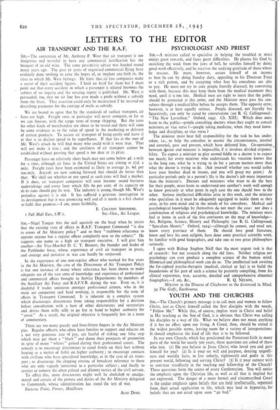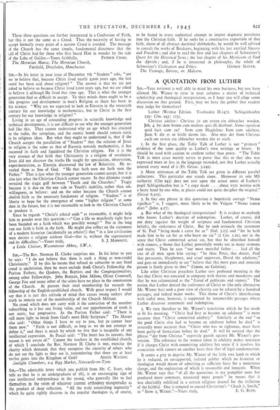YOUTH AND THE CHURCHES
SIR,—The Church's primary message is to call men and women to follow Christ, just as Christ himself called the first disciples with the words, " Follow Me." While this, of course, implies trust in Christ and belief in His teaching as the Son of God, it is obvious that Christ was calling his disciples to a way of life. What we believe does not mean anything if it has no effect upon our living. A Creed, then, should be stated in the widest possible terms, leaving room for a variety of interpretations. It should emphasise the kind of life that is to be followed.
In our own Church, which has proclaimed the Protestant faith in many parts of the world for nearly soo years, three questions are asked of those who join. (t) Do you believe in Jesus Christ, who loved you and gave himself for you? (2) Is it your set will and purpose, denying ungodli- ness and worldly lusts, to live soberly, righteously and godly in this present world, following and serving Christ? (3) Is it your earnest wish to continue steadfastly in the teaching and fellowship of the Church? These questions form the centre of every Confirmation. You will notice the emphasis upon the Christian life, as well as all that is implied but not expressed. The danger of a more formal and circumscribed Creed is the undue emphasis upon beliefs that are held intellectually, separated from.their actual application to life, which may lead to hypocrisy, for beliefs that are not acted upon soon " go bad." These three questions are further interpreted in a Confession of Faith, but this is not the same as a Creed. Thus the necessity of having to accept formally every point of a narrow Creed is avoided. The message of the Church has the same simple, fundamental directness that the call of Christ had for those who first heard Him in wonder by the side































 Previous page
Previous page